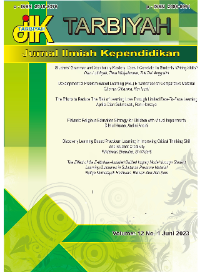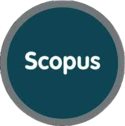The Development of Animation-Based Learning Videos in Comparative Material for Class VII on Junior High School
DOI:
https://doi.org/10.18592/tarbiyah.v12i2.8544Keywords:
animation, audio-visual media, comparative material, learning videosAbstract
This research is motivated by the need for more learning media development to support students' learning processes. This research aims to determine the validity of animation-based learning videos that will be developed in class VII Junior High School (Sekolah Menengah Pertama/SMP). In the implementation process, this research adopted the (R&D) method called Research and Development in foreign languages, referring to the 4D development model. To support the method used by researchers, a data collection tool was used as a validation questionnaire given to material expert validators, media expert validators, and language expert validators. From the validation results, information was obtained in the form of the feasibility of animation-based learning videos in comparative material for class VII SMP, which were developed in the very valid category, with a percentage of media expert assessment of 90%, material expert assessment of 91.4% and language expert assessment of 86%. Based on the overall data analysis results, the learning video media that will be developed is feasible and can be implemented in the learning process in class VII SMP.References
Bello-Bravo, J., Tamò, M., Dannon, E. A., & Pittendrigh, B. R. (2018). An Assessment Of Learning Gains From Educational Animated Videos Versus Traditional Extension Presentations Among Farmers in Benin*. Information Technology for Development, 24(2), 224–244. https://doi.org/10.1080/02681102.2017.1298077
Dalacosta, K., Kamariotaki-Paparrigopoulou, M., Palyvos, J. A., & Spyrellis, N. (2009). Multimedia Application with Animated Cartoons for Teaching Science in Elementary Education. Computers and Education, 52(4), 741–748. https://doi.org/10.1016/j.compedu.2008.11.018
Fatikhah, Ismu & Izzati, Nurma. (2015). Pengembangan Modul Pembelajaran Matematika Bermuatan Emotion Quotient pada Pokok Bahasan Himpunan. Eduma: Mathematic Education Learning and Teaching, 4 (2), 46-61. 10.24235/eduma.v4i2.29.g29
Hardi, J., Hudiono, B., Mirza, A., Studi, P., & Matematika, P. (2013). Deskripsi Pemahaman Siswa pada Permasalahan Perbandingan dan Strategi Solusi dalam Menyelesaikannya. Jurnal Pendidikan dan Pembelajaran Khatulistiwa, 2(5), 1–11.
Iwan, F. (2014). Pemanfaatan Media dalam Pembelajaran. Jurnal Lingkaran Wisyaiswara.
Jazim., Anwar, Rahmad., Bustanul, Rahmawati., Dwi. (2016). Pengembangan Modul Matematika SMP Berbasis Pendekatan Konstruktivisme. Aksioma: Jurnal Pendidikan Matematika, 5(2), 105-109.
Lestari, Witri., & Handayani, Sherly. (2018). Pengembangan Modul Matematika SMP Berbasis Pendekatan Konstruktivisme. Jurnal Analisa, 4(1), 51-60.
Martzoukou, K. (2022). “Maddie is online”: An Educational Video Cartoon Series on Digital Literacy and Resilience For Children. Journal of Research in Innovative Teaching & Learning, 15(1), 64–82. https://doi.org/10.1108/jrit-06-2020-0031
Mou, T. (2023). International Journal of Educational Research Open Science Learning With Designed Animation : Investigation of Primary School Children's Attitudes Toward Science Learning , Animation Integration , And Understanding Level. International Journal of Educational Research Open, 4(September 2022), 100246. https://doi.org/10.1016/j.ijedro.2023.100246
Novitasari, D. (2016). Pengaruh Penggunaan Multimedia Interaktif Terhadap Kemampuan Pemahaman Konsep Matematis Siswa. FIBONACCI: Jurnal Pendidikan Matematika dan Matematika, 2(2), 8. https://doi.org/10.24853/fbc.2.2.8-18
Nst, S. (2019). nK. May. https://doi.org/10.13140/RG.2.2.23312.66562
Ponza, P. J. R., Jampel, I. N., & Sudarma, I. K. (2018). Pengembangan Media Video Animasi pada Pembelajaran Siswa Kelas IV di Sekolah Dasar. Jurnal EDUTECH Universitas Pendidikan Ganesha, 6(1), 9–19.
Rahman, A., Munandar, S. A., Fitriani, A., Karlina, Y., & Yumriani. (2022). Pengertian Pendidikan, Ilmu Pendidikan dan Unsur-Unsur Pendidikan. Al Urwatul Wutsqa: Kajian Pendidikan Islam, 2(1), 1–8.
Riduwan, & Akdon. (2013). Rumus dan Data dalam Analisis Statistika. Alfabeta.
Rusinta, D., Hambali, D., & Winarni, E. W. (2019). Pengembangan Bahan Ajar Buku Cerita Berbasis Discovery Learning Pada Materi IPA Konsep Perpindahan Panas Di Kelas V Sekolah Dasar. Jurnal Pembelajaran dan Pengajaran Pendidikan Dasar, 2(2), 199–209. https://doi.org/10.33369/dikdas.v2i2.11963
Sari, N. M. (2020). Analisis Kesulitan Siswa dalam Mengerjakan Soal Matematika Materi Perbandingan Kelas VII SMP Luhur Baladika. Jurnal Equation: Teori dan Penelitian Pendidikan Matematika, 3(1), 22–33.
Setyadi, Anjas. & Saefuddin, Abdul., Azis. (2019). Pengembangan Modul Matematika dengan Model Pembelajaran Berbasis Masalah untuk Siswa Kelas VII SMP. Phyagoras: Jurnal Pendidikan Matematika, 14(1), 12-22. https://doi.org/10.21831/pg.v14i1.16771
Siagian, M. D. (2016). Kemampuan Koneksi Matematik dalam Pembelajaran Matematika. MES: Journal of Matematics Education and Science2, 2(1), 58–67.
Sugiyono. (2017). Metode Penelitian Kuantitatif, Kualitatif, dan R&D. Alfabeta.
Sugiyono. (2019). Metode Penelitian Kuantitatif, Kualitatif, Dan R&D. In Statistika untuk Penelitian. Alfabeta.
Suryansah, T., & Suwarjo, S. (2016). Pengembangan Video Pembelajaran untuk Meningkatkan Motivasi dan Hasil Belajar Kognitif Siswa Kelas IV SD. Jurnal Prima Edukasia, 4(2), 209. https://doi.org/10.21831/jpe.v4i2.8393
Teng, M. F. (2022). Incidental L2 Vocabulary Learning from Viewing Captioned Videos: Effects of Learner-Related Factors. System, 105(January), 102736. https://doi.org/10.1016/j.system.2022.102736
Thiagarajan, S. (1974). Instructional Development for Training Teachers of Exceptional Children. In A sourcebook (Nomor Mc).
Thoibah, Alisya., Syalsatun., Siregar, Nur. Fatimah., & Heleni, Husda. (2022). Pengembangan Modul Matematika Berbasis Pendekatan Kontekstual pada Materi Segiempat dan Segitiga untuk Memfasilitasi Kemampuan Pemecahan Masalah Matematis Siswa Kelas VII SMP/MTs. Juring: Journal for Research in Mathematic Learning, 5(3), 21-226.
Ünal, I., Okur, N., & Kapucu, S. (2010). The Effect of Using Animations on Pre-Service Science Teachers’ Science Achievement. Procedia - Social and Behavioral Sciences, 2(2), 5357–5361. https://doi.org/10.1016/j.sbspro.2010.03.873
Downloads
Published
How to Cite
Issue
Section
License
Copyright (c) 2023 Desti Tatian Putri, Nur Izzati

This work is licensed under a Creative Commons Attribution 4.0 International License.
Authors retain copyright and grant the journal right of first publication with the work simultaneously licensed under a Creative Commons Attribution 4.0 International License that allows others to share the work with an acknowledgment of the work's authorship and initial publication in this journal.




